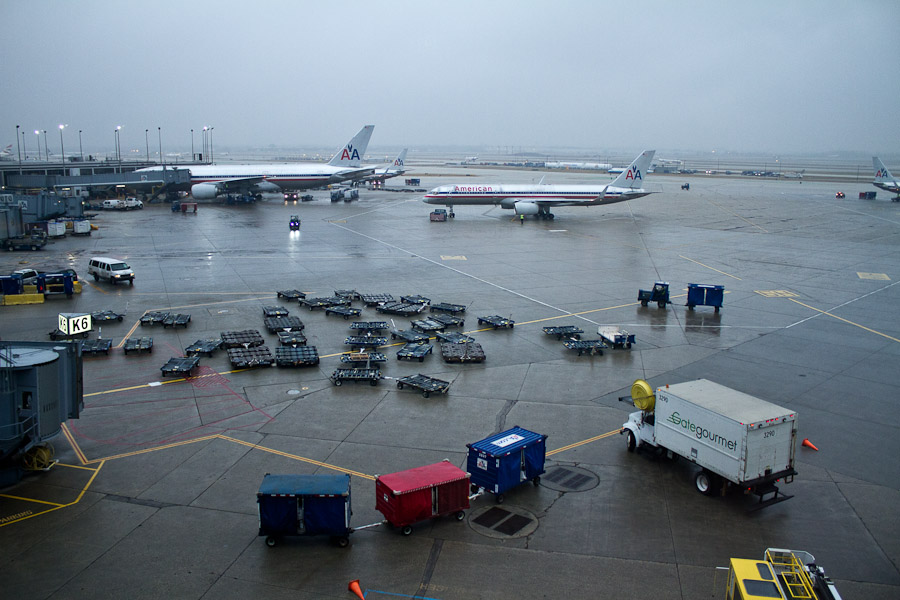The City of Chicago replaced a bridge on a principal north-south street and opened it up to traffic a week ago...but then it closed the next bridge south for five months:
The Chicago Department of Transportation (CDOT) on Friday is opening the new Halsted Street Bridge over the Chicago River North Branch Canal, which has been closed since November 30, 2010 for reconstruction. The new tied-arch bridge will feature two full traffic lanes in each direction—up from the current one lane in each direction—as well as marked bike lanes in each direction, a configuration that will improve traffic flow and safety for motorists and bicyclists.
In addition to reconstructing the bridge, CDOT resurfaced Halsted from south of Division Street to North Branch Street and replaced 20 streetlights. CDOT will add 94 architectural lighting elements by the end of January 2012 and will also resurface the intersection of Division and Halsted in the Spring. The cost of the project will be $13.6 million.
As this bridge opens, CDOT will move to close the Halsted Street Bridge over the North Branch of the Chicago River to start a major repair project that will be completed by May 2012.
Seriously? They couldn't leave the road open for a week?
Here's the affected area:
View Larger Map
After almost exactly 5 days (actually 5 days and 20 minutes), I'm unpacking, laundering, rehydrating, and figuring out where I put the gifts I didn't get a chance to hand out before leaving.
Regular updates resume presently.
Oh, and:

I'm at the Peet's Coffee in Half Moon Bay, Calif., while the rest of the family slowly starts their days. In the past hour I've heard the following:
- "All meditation techniques are awesome."—60-something woman
- "What I really need is someone who's good at syndicating real-estate investments."—the same woman three minutes later
- "If you eat something that only eats vegetarians, that's still vegetarian."—man of unknown vintage wearing dark sunglasses and a pony tail, trying to work out why the Jewish clerk didn't have (a) Christmas dinner or (b) crab meat yesterday
I think the clerk had more difficulty working out how crab meat got involved than how someone living outside San Francisco in the 21st Century failed to grasp the relevance of Christmas to non-Christians. Apparently the latter happens all the time.
Then there's this Captcha I just encountered, which did its job so well it prevented a non-automated system (me) from proceeding:

(This may have been the vendor's attempt at Hanukkah humor.)
The Air Force has released a report about a F-22 crash that killed the pilot:
Capt. Jeffey Haney had his mobility and vision restricted while flying an F-22 at 11,580 m feet and 1,925 km/h [true airspeed], at night, and then the jet cut off his oxygen supply. According to the accident report released last week, Captain Jeffrey Haney became distracted when his oxygen system stopped delivering oxygen. After initiating a descent, he allowed his F-22 to roll past inverted, unchecked. The fighter's attitude resulted in a vertical speed of 293 m/s.
According to the Air Force accident report (PDF), Haney "was recognized throughout his career for exceptional performance." On the accident flight, he was outfitted for cold weather (wore bulky clothing) and night operations (wore night vision goggles). That personal equipment would have "reduced mobility in the cockpit" and interfered with his "ability to look from side to side and down at the consoles" without bracing himself "on various areas in the cockpit." The applicable checklist for failure of the oxygen system includes activation of an emergency oxygen system. That system is actuated via a pull ring that requires 40 pounds of force to actuate and is mounted low and aft to the side of the pilot's ejection seat.
Right before the crash, Capt. Haney attempted to recover, pulling 7.4 G before slamming into the water at Mach 1.2.
The Air Force, naturally, blames the pilot, because the possibility that a $347m airplane has enormous design flaws doesn't exist in the defense appropriation universe. This continues the august tradition of military procurement that includes toy rifles that won't fire in jungles and over-reliance on GPS selective availability in UAVs.
Codey might want to play tug, but Roger couldn't care less:

Codey waits for me to put down the black flashy thing and start playing tug again:

Canon 7D at ISO-6400, 50mm, f/1.8 at 1/250, just a few minutes ago.
Every time I visit San Francisco, I stop here:

Today I only left with 400 g, which unfortunately I'll have to leave with my family. Well, unfortunately for me; knowing them, it won't last two weeks in the house. That's an acceptable outcome.
Via Sullivan, a constitutional analysis of the Stop Online Piracy Act:
To begin with, the bills represent an unprecedented, legally sanctioned assault on the Internet’s critical technical infrastructure. Based upon nothing more than an application by a federal prosecutor alleging that a foreign website is “dedicated to infringing activities,” Protect IP authorizes courts to order all U.S. Internet service providers, domain name registries, domain name registrars, and operators of domain name servers—a category that includes hundreds of thousands of small and medium-sized businesses, colleges, universities, nonprofit organizations, and the like—to take steps to prevent the offending site’s domain name from translating to the correct Internet protocol address.
This not only violates basic principles of due process by depriving persons of property without a fair hearing and a reasonable opportunity to be heard, it also constitutes an unconstitutional abridgement of the freedom of speech protected by the First Amendment. The Supreme Court has made it abundantly clear that governmental action suppressing speech, if taken prior to an adversary proceeding and subsequent judicial determination that the speech in question is unlawful, is a presumptively unconstitutional “prior restraint.” In other words, it is the “most serious and the least tolerable infringement on First Amendment rights,” permissible only in the narrowest range of circumstances. The Constitution requires a court “to make a final determination” that the material in question is unlawful “after an adversary hearing before the material is completely removed from circulation.”
(Emphasis in quoted blog post; references removed.)
I've already written to my representative in Congress; have you written to yours?
Given my activities yesterday (i.e., going through airport security), I found the latest interview with Bruce Schneier timely and once again correct:
As we came by the checkpoint line, Schneier described one of these aspects: the ease with which people can pass through airport security with fake boarding passes. First, scan an old boarding pass, he said—more loudly than necessary, it seemed to me. Alter it with Photoshop, then print the result with a laser printer. In his hand was an example, complete with the little squiggle the T.S.A. agent had drawn on it to indicate that it had been checked. “Feeling safer?” he asked.
To a large number of security analysts, [the billions we've spent on security theater] makes no sense. The vast cost is not worth the infinitesimal benefit. Not only has the actual threat from terror been exaggerated, they say, but the great bulk of the post-9/11 measures to contain it are little more than what Schneier mocks as “security theater”: actions that accomplish nothing but are designed to make the government look like it is on the job. In fact, the continuing expenditure on security may actually have made the United States less safe.
Yes. We spend money on high-tech, whiz-bang solutions to human-intelligence problems. The attack on 9/11 can't happen again in the U.S., not because of full-body scanners at airports, but because of reinforced cockpit doors and vigilant passengers. Should we let just anyone board a transport airplane without a security check[1]? No, of course not; but we should make the checks effective, rather than flamboyant.
Security, however, tends to ratchet up, because no one wants to be the guy who relaxed security right before an attack. And we know an attack will happen someday; nihilists are not easily dissuaded from their crimes. Still, one can hope.
You'll never guess where I am:

It's not so bad, really. Despite warnings of the busiest travel day of the year at O'Hare, it's quiet and relaxed at the moment. From curb to the other side of security took 14 minutes, which isn't a record for me but obviously didn't bother me either.
After a short flight, I'll have curry at Kennedy's tonight with some classmates, then Christmas with the family.